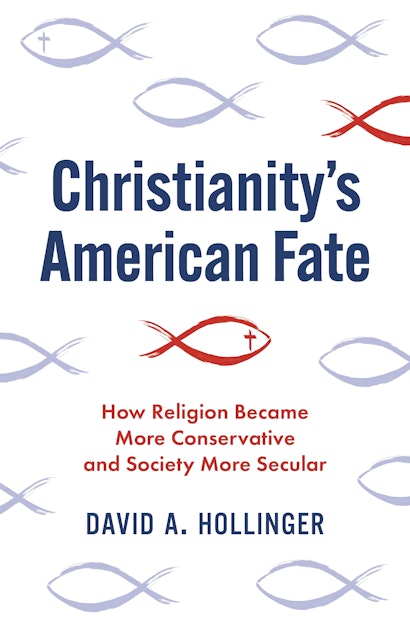Christian Nationalism’s threat to a healthy democracy is a popular topic these days, and with good reason. But few of the many excellent books and articles on the topic explain its origins. Christian Nationalism is anything but new, and it did not emerge out of nowhere. The Christian Nationalism popular among white evangelicals today was developed over many decades in response to a Christian Globalism advanced by the more liberal, ecumenical wing of American Protestantism.
Many Methodist, Congregational, Episcopalian, Presbyterian, and Lutheran leaders of the 1940s and after argued that what Christianity actually demanded from the United States was sympathetic engagement with the needs and interests of the diverse peoples of the entire globe, including adherents of non-Christian faiths. These ecumenical strivings of the old, “mainline” churches often focused on the United Nations and on human rights organizations—liberal Protestant leaders were more responsible than any other lobbying group for putting human rights on the international political agenda of the post-war years. These people were also early advocates of the diplomatic recognition of the People’s Republic of China. Most of them opposed the Vietnam War, and some became among the nation’s most adamant critics of imperialism.
Evangelical voices complained loudly that these liberalizing efforts were deeply flawed by their failure to insist on the unique truth of Christianity. In 1949, the National Association of Evangelicals proposed a constitutional amendment putting God and Jesus in the nation’s Constitution. A similar push was made in 1954, but the mainline leaders joined forty-eight Jewish organizations in opposing this effort to make the USA officially Christian. The Christian Nationalism of our own time is the direct descendent of evangelical initiatives of the 1940s and 1950s.
In a typical manifesto for Christian Globalism, the Harvard scholar of comparative religion Wilfred Cantwell Smith pleaded with his fellow Christians in 1960 to understand that the world’s future was “multicultural,” a word he used three decades before it became popular outside liberal Protestant circles. Writing in the pages of the Christian Century, Smith demanded that Christians humbly accept their standing as just one group among many. The core of Christian Globalism was the idea that Christians must renounce a proprietary relationship to the United States and must turn away from the inherited supposition that God endowed Christians with authority to tell the rest of the world how to behave. It was against this Christian Globalism that evangelicals nursed along their religious nationalism, decade after decade.
It is essential to understand that Christian Globalism was articulated and defended by Protestants who were just as white as Billy Graham. Today’s analyses of Christian Nationalism properly emphasize its white foundation, but race does not explain everything. The history of liberal, ecumenical Protestantism proves compellingly that white people had robust Christian options very different from those offered by evangelical churches. White people had a choice.
White evangelical Protestantism grew in size and in public authority while serving as a safe harbor for white Americans who did not want to accept the challenges of an ethnoracially diverse society and a scientifically informed culture. Those challenges were accepted by the leaders of the old, mainline churches, even if many church members were hesitant and even resistant. The leadership of the ecumenical denominations carried out a multi-decade campaign for a more cosmopolitan Protestantism. This campaign asked the faithful to reject ideas and practices the leadership decided were racist, sexist, imperialist, homophobic, and anti-scientific. Central to this campaign was support for Martin Luther King, Jr. and the Civil Rights Movement he led. While the ecumenical Christian Century was publishing King’s epochal “Letter from the Birmingham Jail,” the evangelical Christianity Today was slow to get beyond the idea that racism was a problem of the human heart, not one for civil government to engage. Asked to comment on King’s 1963 speech at the Lincoln Memorial, Billy Graham said that white and black children of Alabama would walk hand-in-hand “only when Christ comes again.”
The significance of the campaign for a more cosmopolitan Protestantism will be lost if we can see only the limits of what the campaign accomplished. The evils the campaign opposed remain formidable, but the campaign did accomplish two important things. First, it encouraged many American Christians to explore a wider world and to recognize their own provinciality. Exploring that wider world encouraged a global sense of Christianity and a renunciation of the very idea of a Christian America. This openness even led some people to leave the churches and find communities elsewhere; membership in the ecumenical denominations declined in the last third of the twentieth century as the children of the mainliners moved into post-Protestant secularism. Second, the campaign defined the terms on which white evangelical Protestantism became a prominent feature of American public life. Evangelicalism developed not on its own steam but as a dialectical response to ecumenical initiatives, just as the “fundamentalist” movement of the 1920s developed in reaction against the “modernist” movement of that era.
Ecumenical leaders were the key agents in the history of religion and politics in the United States during the last century. By remembering the Christian Globalism they espoused, we gain a more accurate understanding of how we got to where we are today. American proponents of Christian Nationalism have chosen that persuasion while rejecting a vigorously articulated alternative featuring a more commodious vision of the nation and of Christianity.
David A. Hollinger is the Preston Hotchkis Professor of History Emeritus at the University of California, Berkeley. His many books include Protestants Abroad: How Missionaries Tried to Change the World but Changed America and After Cloven Tongues of Fire: Protestant Liberalism in Modern American History (both Princeton).

